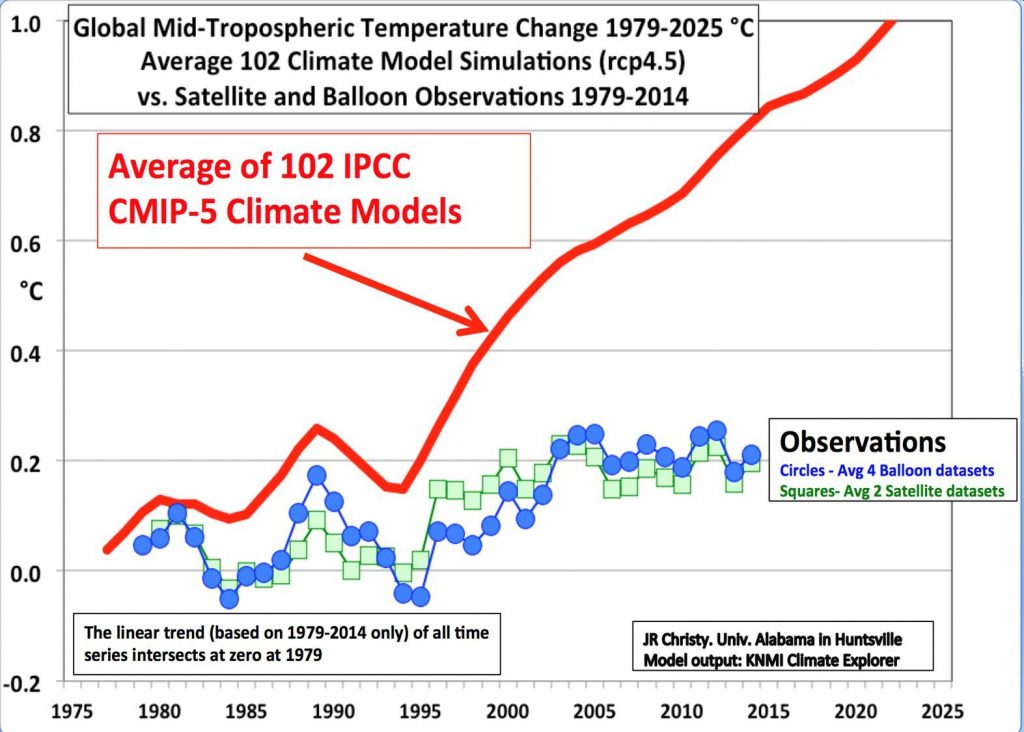
Door de jaren heen heb ik regelmatig aandacht geschonken aan de betrouwbaarheid van klimaatmodellen. Dat hoeft geen verwondering te wekken. Immers, als econoom heb ik in de jaren zeventig samen met mijn vakgenoten moeten ervaren hoe het vertrouwen in de voorspelbaarheid van economische modellen definitief werd ondermijnd, omdat zij niet in staat waren om de stagflatie (een combinatie van stagnatie en inflatie) van die tijd te verklaren. In het toen heersende Keynesiaanse paradigma was deze combinatie onbestaanbaar. Het heeft tot een paradigmaverandering in de economie geleid.
Meer dan tien jaar geleden schreef ik daarover:
… especially during the stagflation of the 1970s economic models demonstrated that they were less and less able to explain and predict economic reality. This made economists increasingly aware of the fundamental limitations of the model-based approach to the economy. Will climatologists also come to the same conclusion?
Dat is er echter tot op heden nog nauwelijks van gekomen. Gehandicapt door groepsdenken en cognitieve dissonantie is deze eenvoudige constatering, waarvoor je echt niet hoeft te hebben doorgeleerd in de klimatologie, door de meesten nog niet opgepikt. Met de opwarmings’pauze’ of hiatus is thans nog duidelijker dan voorheen dat ook klimaatmodellen met overeenkomstige problemen hebben te kampen.
In ons boekje, ‘Man-Made Global Warming: Unravelling a Dogma’, van 2004 (nog steeds verkrijgbaar!) zijn Dick Thoenes, Simon Rozendaal en ik reeds uitvoerig ingegaan op de tekortkomingen van klimaatmodellen.
In een later stadium heb ik daar samen met de mathematicus, prof. dr. Theo de Vries (TU Twente), opnieuw aandacht aan geschonken.
Onlangs heeft ook de Amerikaanse klimatologe Judith Curry haar bevindingen ter zake op een voor een breed publiek toegankelijke wijze uiteen gezet. Hier volgt de samenvatting van haar essay.
Executive Summary
There is considerable debate over the fidelity and utility of global climate models (GCMs). This debate occurs within the community of climate scientists, who disagree about the amount of weight to give to climate models relative to observational analyses.
GCM outputs are also used by economists, regulatory agencies and policy makers, so GCMs have received considerable scrutiny from a broader community of scientists, engineers, software experts, and philosophers of science. This report attempts to describe the debate surrounding GCMs to an educated but nontechnical audience.
Key summary points
• GCMs have not been subject to the rigorous verification and validation that is the norm for engineering and regulatory science.
• There are valid concerns about a fundamental lack of predictability in the complex nonlinear climate system.
• There are numerous arguments supporting the conclusion that climate models are not fit for the purpose of identifying with high confidence the proportion of the 20th century warming that was human-caused as opposed to natural.
• There is growing evidence that climate models predict too much warming from increased atmospheric carbon dioxide.
• The climate model simulation results for the 21st century reported by the Intergovernmental Panel on Climate Change (IPCC) do not include key elements of climate variability, and hence are not useful as projections for how the 21st century climate will actually evolve.
Climate models are useful tools for conducting scientific research to understand the climate system. However, the above points support the conclusion that current GCMs are not fit for the purpose of attributing the causes of 20th century warming or for predicting global or regional climate change on timescales of decades to centuries, with any high level of confidence.
By extension, GCMs are not fit for the purpose of justifying political policies to fundamentally alter world social, economic and energy systems. It is this application of climate model results that fuels the vociferousness of the debate surrounding climate models.
Aldus Judith Curry.
Lees verder hier.
Hoe lang moet het nog duren voordat de mainstream klimatologen en de hen slaafs volgende politici het licht zien?
Voor mijn eerdere bijdragen over klimaat en aanverwante zaken zie hier, hier, hier, hier en hier.






Hans het is volgens mijn beeldvorming niet alleen de kwaliteit en het gebrek aan betrouwbaarheid van klimaatmodellen maar ook de selectie van de uitkomsten.
In Rusland komt er ook een voorspelling over een komende ijstijd op basis van modelberekeningen.
https://nl.express.live/2015/11/06/russische-wetenschapster-voorspelt-mini-ijstijd-tussen-2030-en-2040-exp-216770/
Ook hier bij ons zie je als resultaat een ijstijd en die wordt weggeredeneerd.
http://www.volkskrant.nl/buitenland/mini-ijstijd-breekt-spontaan-aan-in-computermodel~a3547331/
Met andere woorden door de selectie van resultaten zien we in de praktijk van het IPCC alleen de door hen gewenste opwarming als uitkomst boven drijven vervolgens wordt het resultaat op basis van aerosolen getuned op de cijfers van het verleden en vaak ook nog eens vele malen herhaald door de collega broodwetenschappers die dan roepen dat er consensus is over deze toch el alarmerende uitkomst.
Graag even een linkje naar de wetenschappelijke publicatie waar uit blijkt dat Zharakova een ijstijd voorspeld
Tenslotte kunnen we de MSM niet vertouwen
Dus bron Hugo en geen kranten artikeltjes over pennen
Henk,
Ik zou zeggen, zoek zelf even via Google. Dan vindt u vanzelf de artikelen van professor Valentina Zharkova.
Als u werkelijk geïnteresseerd bent in dit onderwerp zou dit geen nieuws moeten zijn.
Het is ook geen nieuws en het is ook al behandeld op dit forum dat er geen wetenschappelijke publicaties zijn van Zharakova die een kleine ijstijd voorspellen, wel een minder actieve zon, maar zij geeft specifiek geen antwoord op de vraag of dit invloed heeft op het klimaat
Zij laat het dus open, kranten artikeltjes zijn geen wetenschap
Beste Henk
Dat wil ik best doen als jij eerst komt met bewijs dat er sprake is van een gevaarlijke opwarming als gevolg van een geringe toename van 120ppm CO2 tot nu 400ppm in de atm.
CO2een broeikasgas wat ongeveer dezelfde broeikaswerking heeft als H2O waarvan er gemiddeld 40.000 ppm in onze atmosfeer voorkomt naast alle andere broeikasgassen die we in de atmosfeer
” waterdamp (H2O), koolstofdioxide (CO2), distikstofoxide (N2O), stikstofdioxide (NO2) en ozon (O3)
En de broeikasgassen zoals methaan (CH4), freon (CF2Cl2), CFCl3 en zwavelhexafluoride (SF6) veroorzaken nog een sterker broeikaseffect.
En kom dat ook even met sluitend bewijs van de versterkende werking van waterdamp.
Als je dat bewijs kunt leveren heb je recht van spreken.
Henk,
Zharkova et al proberen met behulp van een tweetal geneste cosinusreeksen (mijn omschrijving) het verloop van de zonneactiviteit te bepalen. Zij tunen die reeksen met data van de cicli nrs 21 t/m 24.
Zij stellen dat de huidige (voorbije ?) warmteperiode een gevolg is van de hoge zonneactiviteit in de tweede helft van de vorige eeuw en ook dat o.a. het maunderminimum samenvalt met de (met genoemde reeksen berekende) lage zonneactiviteit in die periode.
Vervolgens komen zij met de cos.-reeksen tot een periode met lage activiteit, vergelijkbaar met die tijdens het maunderminimum, ruwweg tot ver in de huidige eeuw. Zij merken op dat dat consequenties heeft voor het huidige klimaatdebat.
Nog even een fragmentje:
” […] significantly reduced amplitudes of the summary curve and, thus, in the strongly reduced solar activity in cycle 26, or the next Maunder Minimum lasting in 3 cycles 25–27.”
Henk, jouw opmerking dat Zharkova geen ijstijd voorspelt krijgt zo een heel andere betekenis..
Inderdaad Zharakova praat over de zonneactiviteit en de “sceptici” bedenken de temperatuur erbij
Geloof je me niet ga dan op zoel naar de wetenschappelijke publicatie en niet naar de sprookjes in de MSM
Zonder zon doen broeikasgassen niet veel. Minder zonne-activiteit => lagere temperature.
Boels
Ja als morgen de zonniiyvalt wordt het heel koud !
Maar de vraag blijft natuurlijk hoeveel??
En onderzoek laat zien dat het maximaal 0,1C minder opwarming zou betekenen
Ja dat zal inderdaad de afkoeling wel zijn tenslotte hebben we nu ongeveer 0,18c opwarming per 10 jaar dus dat scheelt 5 jaar opwarming
Henk, hoeveel graden is het ’s nachts kouder. Soms wel 10 graden, met dezelfde hoeveelheid CO2
CO2 doet niets, maar de zon wel.
Het trieste is dat in onze praktijk de MSM dit soort alarmisme blijven voeden met selectief gekozen voorbeelden en veel mensen worden bang gemaakt en komen tot de conclusie dat dan de voorspellingen wel juist moeten zijn.
Kijk eens naar de volkskrant:
IJsberg ter grootte van Singapore losgebroken van Antarctica
Een gigantische ijsberg bij de Pine Island-gletsjer heeft zich losgemaakt van Antarctica en beweegt zich langzaam in de richting van de open oceaan. Het zou daardoor een bedreiging kunnen vormen voor de drukke scheepvaartroutes, meldt CNN. De ijsberg scheurde in juli af van de Pine Island-gletsjer, de langste en snelst voortbewegende gletsjer in Antarctica.
en verder:
De Pine Island Glacier is volgens wetenschappers de snelst verdwijnende gletsjer op Aarde. Elke zes tot tien jaar scheuren er grote ijsbergen af. Volgens de onderzoekers is het voor het eerst dat de baan van zo’n grote ijsberg wordt gevolgd en is dat belangrijker dan de effecten van de opwarming van de aarde.
http://www.volkskrant.nl/buitenland/ijsberg-ter-grootte-van-singapore-losgebroken-van-antarctica~a3545319/
Dat moet toch wel heel erg zijn rampscenario.
Helmaal in de leer van de alarmcentrale van het IPCC.
Kloppen de modeluitkomsten dan toch smelt zelfs de zuidpool nu ook al versneld af of zou er een andere oorzaak zijn?
Niet voor niets wordt hier het volgende geschreven :
“Volgens de onderzoekers is het voor het eerst dat de baan van zo’n grote ijsberg wordt gevolgd en is dat belangrijker dan de effecten van de opwarming van de aarde.”
Er wordt duidelijk niet aangegeven dat hier de verschrikkelijke opwarming de oorzaak is maar het wordt wel even genoemd en de gemiddelde lezer heeft niet eens door dat ze op deze wijze bewerkt worden.
De praktijk is dat we het hier hebben over een gebied met grootschalige vulkanische activiteit en dat weet de schrijver van dit artikel ongetwijfeld ook..
De praktijk
Nu, een nieuwe studie vindt dat deze subglaciale vulkanen en andere geothermische “hotspots” dragen bij tot het smelten van Thwaites gletsjer, een belangrijke rivier in het ijs dat mondt uit in Antarctica van Pine Island Bay. Gebieden van de gletsjer die in de buurt van geologische kenmerken gezien zitten als vulkanische smelten sneller dan de regio’s verder weg van hotspots, zei Dustin Schroeder, hoofdauteur van de studie en een geofysicus aan de Universiteit van Texas in Austin.
Deze smelten kan aanzienlijk beïnvloeden ijs verlies in de West Antarctische, een gebied dat het ijs snel verliest.
http://www.phpld.net/verborgen-vulkanen-smelten-antarctische-gletsjers-van-onderaf.html
Dit soort nepnieuws maakt het gedram van het IPCC op basis van modellen enorm geloofwaardig en zou bestreden moeten worden.
De vraag is alleen hoe wie heeft een idee?
En heb je aanwijzing dat de vulkanen actiever worden of heb hè dat er vrolijk bij verzonnen ?
http://www.nature.com/articles/ngeo2388.epdf?referrer_access_token=BINsRhP52JUWkx9Q_euqEtRgN0jAjWel9jnR3ZoTv0M6FkI2Id53a8a4YoVhkHdRG78d4BhJ6vjwvD1uMRYSSalfeJcO4JHUmSf9diwpj9CKIC5esHxs3hcTyqhbbYwTDdrjBlckGmuanh3BSuDLSyGbBMHbzODoAjlD0f6cGFA6aJXgEo_Ec3K-qTNga2lF7BSHPCTLpSZr_-jPzEJrwTf-GZ2eCtU4v4bnHghhEAcKA8GeqnAeXk2iKf1rURVc5OqgGPNbDq5T-UBftMdQcu_JR3cFMTCh7MTXBun-uFM%3D&tracking_referrer=www.washingtonpost.com
De waarheid is zelden relevant.
Mujahedeen, Al qaida, Isis, 9/11, MH17, Bali, Nice, Bataclan, Charlie Hebdo, Munchen, Sandy Hook, Zaventem, Breivik, Berlijn, Jerusalem…
Nu ben ik echt een leek op dit gebied, maar wel geïnteresseerd in dit onderwerp.
Ik vraag mij af hoe deze grafiek tot stand is gekomen?
Ik ga er vanuit dat de grafiek in dit artikel op basis van exact gegevens is overgenomen, maar als ik met mijn beperkte kennis het rapport mevrouw Curry (wat vluchtig) bekijk dan zie ik zo snel voornamelijk grafieken waarbij de waarnemingen lang niet zo ver van de voorspellingen af lijken te liggen. Is er een korte eenvoudige uitleg hierover?
De grafiek boven aan dit artikel is een verzinseltje zonder enige wetenschappelijke basis
Dat is al veel vaker besproken en aangetoond Jammer dat de “sceptici” zo goedgelovig zijn dat ze alles geloven wat hun mening bevestigd
Jammer maar helaas
Beste Henk,
Ik ben vrij nieuw op deze website, maar als ik de reacties lees die jij schrijft vraag ik mij af wat jij hier zoekt, anders dan een beetje de trol uit te hangen.
Zelf heb ik interesse in zoveel mogelijk invalshoeken en liefst onderbouwd met harde metingen en waarnemingen.
Dick,
Zie:
https://judithcurry.com/2015/12/17/climate-models-versus-climate-reality/
Dank je Hans!
Klimaatmodellen zijn producten die voorzien in de behoefte (en verslaving) aan zekerheid en maakbaarheid bij bewoners van comfortabele welvaartsmaatschappijen zoals de onze. We eisen die zekerheid op, omdat we veel te verliezen hebben. Weinig mensen realiseren zich echter dat een model niet de echte wereld voorstelt, maar simpelweg een metafoor is. Klimaatalarmisme en actie levert een vorm van zekerheid. Het suggereert dat we vroeger of later het klimaat kunnen controleren.
Henk noemt de grafiek hierboven een leugen. Wellicht omdat er een hoop klimaatkrijgers hun afschuw hierover hebben uitgesproken. En wat je niet wilt, is natuurlijk automatisch een leugen, want als groepsdenker heb je altijd absoluut gelijk, daar valt nooit aan te tornen.
Nu is in zekere zin de grafiek inderdaad minder correct, maar wel de verkeerde kant op. Het geeft immers de resultaten van RCP 4.5 , om precies te zijn:
“Representative Concentration Pathway (RCP) 4.5 is a scenario that stabilizes radiative forcing at 4.5 W m−2 in the year 2100 without ever exceeding that value.”
https://www.skepticalscience.com/rcp.php?t=3
Daarboven zitten nog RCP 6 en RCP8.5, de laatste gaat uit van ongebreidelde emissies van allerlei goedjes, kortom de huidige realiteit, en dat zou veel realistischer zijn, hoewel het verschil nog niet erg groot is.
http://web.aria.fr/creator/E3P/pages/page_15.php
“Henk noemt de grafiek hierboven een leugen”.
Persoonlijk heb ik nooit veel met grafieken gehad. Ook niet met bovenstaande, beroemde grafiek van John Christy. Je moet niet vergeten dat onder iedere grafiek een epistemologisch complot ligt van opeenvolgende stappen met wetenschappelijke proposities. Het gaat niet zozeer over de proposities afzonderlijk, maar meer over de geldigheid van de verbindende schakels.
Die geldigheid is erg afhankelijk van de wetenschapper en vooral van zijn onderbuik.
Om met Ruben Mersch te spreken: Een grafiek is meestal niet het resultaat van het ondervragen van de werkelijkheid, maar van het martelen. Net zo lang totdat ze bekent wat we graag willen horen of zien. Hou daar dus rekening mee.
Die grafiek duikt ter vereenvoudiging geregeld op. Deze is een weergave van de echte:
http://www.drroyspencer.com/2013/04/global-warming-slowdown-the-view-from-space/
Die zwarte lijn is het zogenaamde gemiddelde van 44 modellen welke elk een hypothese is. Daarom is dat gemiddelde statistisch gesproken onjuist. Er is een grafiek met 102 modellen en weer dat gemiddelde. Dit gemiddelde wordt door het IPCC misbruikt om de afwijkende meetresultaten binnen een zogenaamd betrouwbaarheidsinterval te houden. Dit is grote onzin, maar PR-gezien briljant en iedereen trapt erin. http://www.groenerekenkamer.nl/5878/statistisch-zand-ogen-strooien/
Ter aanvulling dit stuk van Marcel Crok http://www.nlslash.nl/climategate/151029_NNV_presentatie_Crok.pdf (ook voetnoot 30)
Meer over die grafiek. Een ruim jaar geleden kwam deze ook eens aan de orde waarbij de toenmalige Henk er enthousiast tegen van leer trok en een aantal furieuze wereldredders citeerde, die op het ongewenste van de grafiek wezen en ook hoe extreem fout deze wel niet was. Uiteindelijk bleek de kapitale zonde van de maker te zijn, het verticaal schuiven met de nullijn. Ze vonden dat je trends niet kon vergelijken wanneer je arbitrair een gemeenschappelijk nulpunt ging bepalen.
Wat je wel kunt is het verloop van de trends plotten. Dat betekent een wiskundige differentiatie en HBS-b-ers van heel vroeger weten dat daarbij de constante wegvalt, zodat verticaal schuiven van de nullijn geen factor meer is.
Bovendien is er zoiets als een foutmarge en statistiek. Is de deviatie tussen droom en daad wel echt een praktisch bezwaar (vrij naar Willem Elsschot)? Is het wel statistisch significant?
Daarop heb ik destijds (Nov 2015) deze grafiek uitgezwoegd:
https://dl.dropboxusercontent.com/u/22026080/trends-stdev.png
Dit vergelijkt alle dertigjarige trends van RCP8.5 runs met die van de global temperature trends van HADCRU4T, GISS en RSS, inclusief de standaard deviatie van alle modellen runs.
Afgezien van het feit dat de ‘hindcast‘ van RCP8,5 van voor 1960 een zooitje was, zitten HADCRU en GISS nu zo’n anderhalve standaard deviatie onder de “projectie” en RSS ruim meer dan twee standaard deviaties onder de voorspelling van RCP8.5.
Hoe statistisch relevant is dat?
Zo komt het IPPC er steeds mee weg door niet a priori de overschrijdingskans of het betrouwbaarheidsinterval te benoemen. Je kunt er donder op zeggen dat in 2018 het betrouwbaarheidsinterval is opgerekt naar 99% om de schijn op te houden dat de klimaatmodellen nog steeds met de meetresultaten in de pas lopen.
Dat meetresultaten binnen dit interval liggen is nog geen bewijs voor causaliteit, iets wat het IPPC wel suggereert. Kunstmatig achteraf statische deviatie opvoeren zonder een vooraf gedefinieerd criterium geformuleerd te hebben is vals spelen.